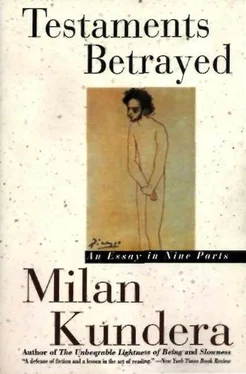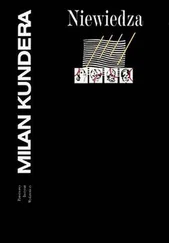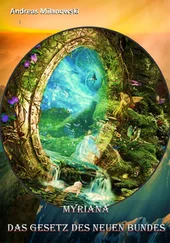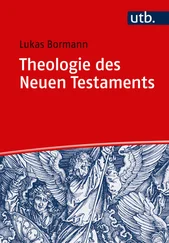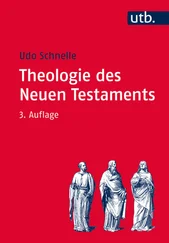I see no Cardinal du Bellay, no Francois I, in today's Europe. But is Europe still Europe? Is it still "the society of the novel"? In other words, is it still living in the Modern Era? Or is it already moving into another era, as yet unnamed, for which its arts are no longer of much importance? If that is so, why be surprised that Europe was not disturbed beyond measure when, for the first time in its history, the art of the novel- Europe's art par excellence-was condemned to death? In this new age, after the Modern Era, has not the novel for some time already been living on death row?
To define precisely the art I am discussing, I call it the European novel. By that I mean not only novels created in Europe by Europeans but novels that belong to a history that began with the dawn of the Modern Era in Europe. There are of course other novels, the novel of China, of Japan, the novel of ancient Greece, but they are not bound by any continuous evolutionary
line to the historical enterprise that began with Rabelais and Cervantes.
I speak of the European novel not only to distinguish it from, say, the Chinese novel but also to point out that its history is transnational; that the French novel, the English novel, the Hungarian novel, are in no position to create autonomous histories of their own but are all part of a common, supranational history that provides the only context capable of revealing both the direction of the novels evolution and the value of particular works.
At different phases of that evolution, different nations, as in a relay race, took the initiative: first Italy with Boccaccio, the great precursor; then France with Rabelais, and Spain with Cervantes and the picaresque novel; the English novel in the eighteenth century and then, toward the century's end, the German contribution, with Goethe; the nineteenth century, which belonged almost entirely to France, along with the Russian novel in the last third, and, immediately thereafter, the arrival of the Scandinavian novel. Then the twentieth century and its Central European adventure with Kafka, Musil, Broch, and Gombrowicz…
If Europe were only a single nation, I do not believe the history of its novel could have lasted with such vitality, such power, and such diversity for four centuries. It was the ever new historical situations (with their new existential content), arising in France, then in Russia, then elsewhere, and somewhere else again, that kept the art of the novel going, brought it new inspirations, suggested new aesthetic solutions. It is as if in the course of its journey the history of the novel kept waking the different parts of Europe, one after
the other, confirming them in their specificity and at the same time integrating them into a common European consciousness.
In our own century, for the first time, the important initiatives in the history of the European novel are appearing outside Europe: first in North America, in the 1920s and 30s, and then, in the 60s, in Latin America. What with the pleasure provided me by the art of the French-speaking Antillean novelist Patrick Chamoiseau, and then by Rushdies, I would prefer to speak more generally of the novel from below the thirty-fifth parallel, the novel of the South: a great new novelistic culture characterized by an extraordinary sense of the real coupled with an untrammeled imagination that breaks every rule of plausibility.
I am delighted by that imagination without understanding completely where it comes from. Kafka? Certainly. For our century, it is he who gave legitimacy to the implausible in the art of the novel. Yet the Kafkan imagination is different from Rushdies or Garcia Marquez's; that teeming imagination seems rooted in the very specific culture of the South; for example, in its still living oral literature (Chamoiseau drawing inspiration from the Creole storytellers) or, as Fuentes likes to recall, in the Latin American Baroque, more exuberant, more "crazy," than Europe's.
Or another key to that imagination: the tropical-ization of the novel. I refer to Rushdie's fantasy: Farishta hovers above London and wishes to "tropical-ize" that hostile city. He lists the advantages of tropi-calization: "institution of a national siesta… new birds in the trees (macaws, peacocks, cockatoos), new trees under the birds (coco-palms, tamarind, banyans with hanging beards)… religious fervour, political ferment… friends to commence dropping in on one another without making appointments, closure of old folks' homes, emphasis on the extended family… spicier food… Disadvantages: cholera, typhoid, legionnaires' disease, cockroaches, dust, noise, a culture of excess."
("Culture of excess" is an excellent expression. The tendency of the novel in the last stages of its modernism: in Europe: the ordinary pursued to its utmost; sophisticated analysis of gray on gray; outside Europe: accumulation of the most extraordinary coincidences; colors on colors. The dangers: in Europe, tedium of gray; outside Europe, monotony of the picturesque.)
The novels created below the thirty-fifth parallel, though a bit. foreign to European taste, are the extension of the history of the European novel, of its form and of its spirit, and are even astonishingly close to its earliest beginnings; nowhere else today does the old Rabelaisian sap run so joyfully as in the work of these non-European writers.
The Day Panurge No Longer Makes People Laugh
Which brings me back one last time to Panurge. In Pantagruel, he falls in love with a woman and is determined to have her at all costs. In church, during mass (isn't that a hell of a sacrilege!), he addresses her with some outrageous obscenities (in today's America, such "verbal rape" would cost him dear) and, when she refuses to listen, takes his revenge by sprinkling her gown with the minced genitals of a bitch in heat. As she leaves the church, all the dogs roundabout (six hundred thousand and fourteen, says Rabelais) run up and piss on her. I remember living in a workers' dormitory when I was twenty, my Rabelais in Czech translation under my bed. The men were curious about this fat book, and time and again I had to read them the story, which they soon knew by heart. Even though these were people of a rather conservative peasant mentality, their laughter hadn't a trace of condemnation for that rhetorical and urinary harasser; they adored Panurge, so much so that they gave his name to one of our companions; no, not a womanizer, but a youngster known for his naivete and his exaggerated chastity, who was ashamed to be seen naked in the shower. I can hear their cries as if it were yesterday: "Panurk"-our Czech pronunciation of the name- "get into the shower! Or well wash you down with dog piss!
I can still hear that hearty laughter, making fun of a pal's modesty but at the same time showing an almost marveling affection for it. They were delighted by the obscenities Panurge addresses to the woman in church, but equally delighted by the punishment the woman's chastity inflicted on him and then, to their great pleasure, her own punishment by the dogs' urine. With what or whom did my erstwhile companions sympathize? With modesty? With immodesty? With Panurge? With the woman? Or with the dogs who had the enviable privilege of urinating on a beauty?
Humor: the divine flash that reveals the world in its moral ambiguity and man in his profound incompetence to judge others; humor: the intoxicating relativity
of human things; the strange pleasure that conies of the certainty that there is no certainty.
But humor, to recall Octavio Paz, is "the great invention of the modern spirit." It has not been with us forever, and it won't be with us forever either.
With a heavy heart, I imagine the day when Panurge no longer makes people laugh.
Читать дальше
